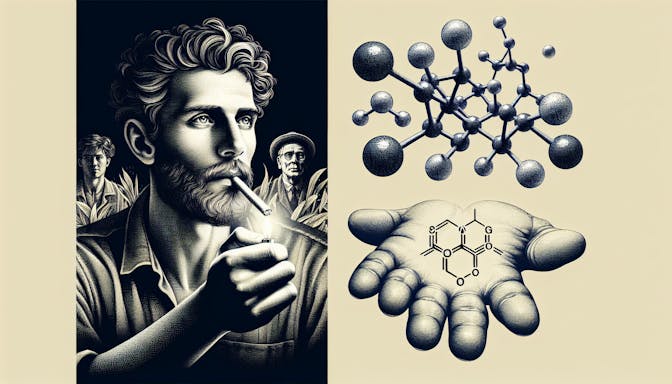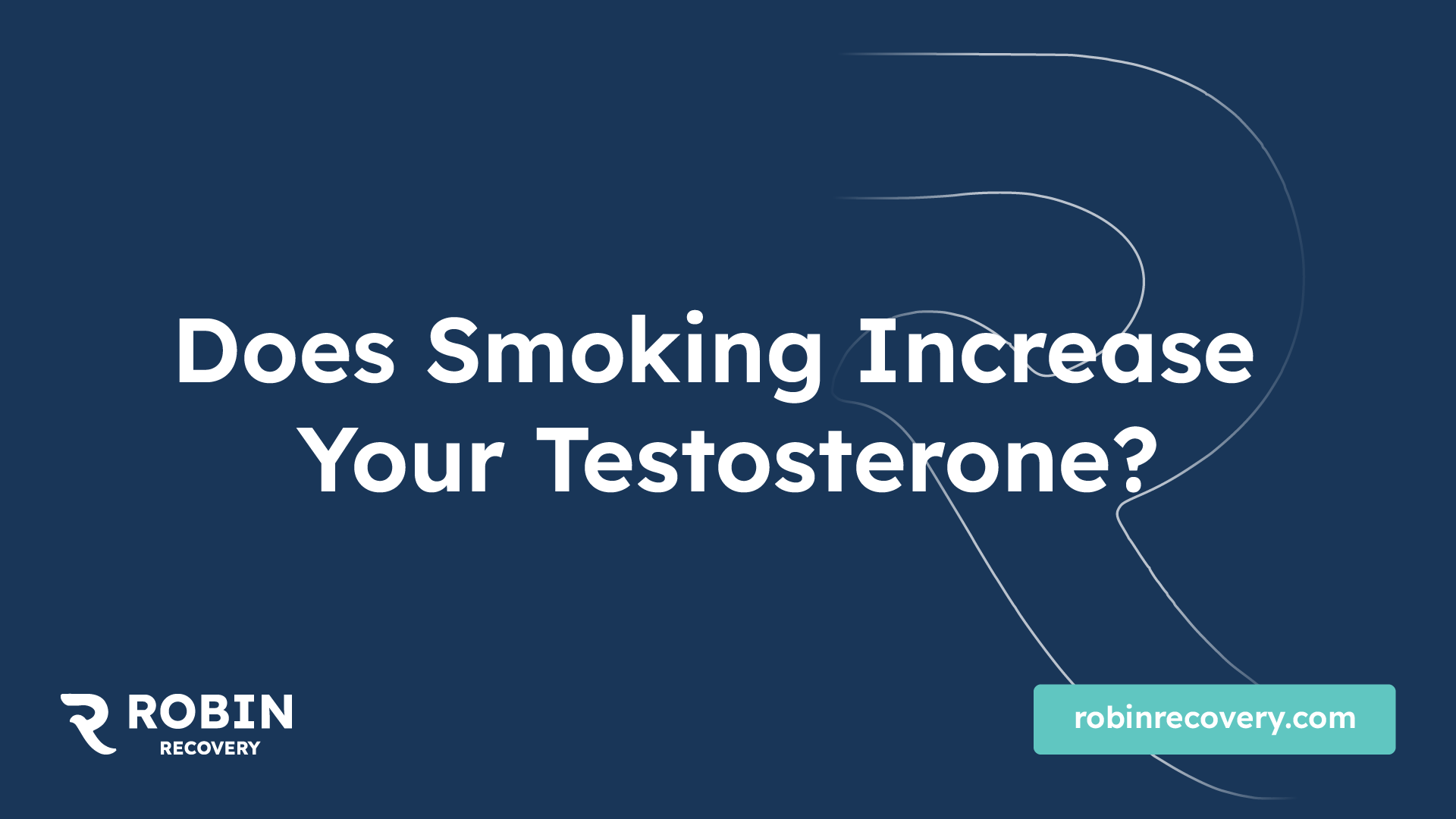Does Smoking Increase Your Testosterone?

Smoking and Testosterone Levels
The relationship between smoking and testosterone levels is a topic of interest in medical research. The question "Does smoking increase your testosterone?" is often asked. Studies have yielded some interesting findings that we will delve into in this section.

Impact of Smoking on Testosterone
Research has shown that men who smoke have significantly higher levels of total and free testosterone compared with men who have never smoked [1]. This elevation in testosterone levels increases with the number of cigarettes smoked daily.
Despite these findings, it's important to note that the health risks associated with smoking far outweigh any potential hormonal changes. The negative health impacts of smoking, such as lung cancer, heart disease, and other serious conditions, should not be overlooked.
Studies on Smoking and Testosterone
Several studies have investigated the relationship between smoking and testosterone levels. A study cited on PubMed found that smoking has a positive and independent effect on testosterone levels. Smokers had significantly higher total testosterone (TT) and free testosterone (FT) levels compared to non-smokers, even after stratification based on age, BMI, triglycerides, and alcohol consumption.
However, it was also found that both TT and FT levels were negatively correlated with the amount of tobacco exposure, indicating that while smoking might elevate testosterone levels initially, long-term heavy smoking could potentially lead to a decrease in these levels.
Another study found that smoking was an independent predictor of TT and FT levels in multivariate logistic regression models, even after adjusting for age, BMI, fasting blood glucose, triglycerides, alcohol consumption, and estradiol.
These studies suggest that while smoking may increase testosterone levels initially, the long-term effects are not yet fully understood and more research is needed. It's also important to remember that smoking carries severe health risks and should not be considered as a method to increase testosterone levels.
Nicotine Effects on Testosterone
One of the central questions people often ask about smoking is, "does smoking increase your testosterone?" To answer this, we need to examine the influence of nicotine, a key active ingredient in tobacco, on testosterone levels.
Nicotine's Influence on Testosterone
Nicotine, which is readily absorbed through the lungs and oral mucosa, has been found to have a complex relationship with testosterone levels. According to a study cited on PubMed, smoking men had significantly higher levels of total and free testosterone compared with men who never smoked. Additionally, total and free testosterone levels increased significantly with the increasing number of cigarettes smoked daily.
However, it's important to note that nicotine or its metabolites could competitively inhibit androgen disposal, which would be expected to increase testosterone levels ScienceDirect.
On the other hand, a study on NCBI found that nicotine administration significantly decreased testosterone levels in male albino rats in a dose-dependent manner. The decrease in testosterone levels is associated with testicular dysfunction rather than a pituitary disorder.
Effects of Nicotine Products
The effects of nicotine are not limited to traditional cigarettes. Other nicotine products, such as e-cigarettes, may also influence testosterone levels. According to ScienceDirect, these products may raise testosterone levels.
However, there's a notable increase in luteinizing hormone (LH) levels in male albino rats following nicotine administration, particularly in the high-dose treated group NCBI. LH is a hormone that plays a key role in the production of testosterone.
In conclusion, nicotine's relationship with testosterone levels is multifaceted and complex. While there's evidence suggesting that nicotine could increase testosterone levels in humans, other studies have found that it may decrease testosterone levels in certain animal models. These mixed findings emphasize the need for further research to fully understand the effects of nicotine on testosterone and the potential health implications associated with nicotine use.
Smoking and Hormonal Changes
The relationship between smoking and hormonal changes is a complex one, with research indicating that smoking can significantly influence hormone levels in the body. This relationship is particularly notable in the context of testosterone, the primary male sex hormone. Studies have shown varied results, with some indicating that smoking may increase testosterone levels, while others suggest a decrease.
Hormonal Responses to Smoking
Smoking men had significantly higher levels of total and free testosterone compared with men who never smoked. Total and free testosterone levels increased significantly with the increasing number of cigarettes smoked daily [1]. However, the effects of smoking on testosterone levels in women are not as clear, with some studies indicating no significant association.
In addition to testosterone, other hormones such as follicle stimulating hormone (FSH), luteinizing hormone (LH), and prolactin are also impacted by smoking. In a study on male albino rats, nicotine administration significantly decreased FSH levels, while LH and prolactin levels increased, particularly in the high-dose treated group [4].
The effects of nicotine on these hormones were dose-dependent and were ameliorated with nicotine cessation.
Age-Related Effects
The impact of smoking on hormone levels can vary depending on age, with older individuals potentially experiencing different effects compared to younger individuals.
Moreover, the use of nicotine products, such as e-cigarettes, has been found to potentially raise testosterone levels [5]. However, a small study from 2022 found that baseball players who chewed nicotine gum had lower levels of salivary testosterone after 30 minutes, which returned to typical levels after completing physical tests [3].
The complex relationship between smoking, nicotine, and hormonal changes emphasizes the need for further research to better understand this interplay and its potential health implications. It's also crucial to consider these factors when assessing the claim of increased testosterone from smoking.
Testosterone and Smoking Habits
The relationship between smoking and testosterone levels has been a topic of numerous studies and debates. Despite the negative health effects associated with smoking, some research indicates that smoking might indeed affect testosterone levels.
Relationship Between Testosterone and Smoking
Studies show a correlation between smoking and higher testosterone levels. According to PubMed, men who smoked had significantly higher levels of total and free testosterone compared with men who never smoked. This was observed even after accounting for factors such as age, body mass index (BMI), triglycerides, and alcohol consumption.
However, these findings do not imply that smoking is beneficial for boosting testosterone. Smoking has numerous negative health effects, including impacts on the endocrine system, which can contribute to the development of diseases like diabetes mellitus and obesity.
Correlation with Cigarette Consumption
The relationship between testosterone levels and the number of cigarettes smoked daily also shows a significant correlation. The same PubMed study cited earlier indicated that total and free testosterone levels increased significantly with the increasing number of cigarettes smoked daily.
In contrast, another PubMed study reported a negative correlation between both total testosterone (TT) and free testosterone (FT) levels and the amount of tobacco exposure, indicating a complex relationship.
Despite these correlations, it's crucial to remember that smoking poses severe health risks and is not a recommended method to increase testosterone. It's also important to note that the relationship between testosterone and smoking is multifaceted, and other factors need to be considered in understanding the overall effects of smoking on hormonal balance.
Endocrine System and Smoking
The myth that smoking can increase your testosterone levels is a complex one to debunk due to the intricate nature of the endocrine system. This system is responsible for the balance of hormones in the human body and can be significantly impacted by smoking.
Negative Impacts on Endocrine System
Smoking and the consumption of nicotine can have detrimental effects on the endocrine system. Nicotine rapidly enters the bloodstream when inhaled, crosses the blood-brain barrier, and reaches the central nervous system where it acts as a stimulant. The effects of nicotine on the endocrine system include increased release of catecholamines into the bloodstream, increased release of plasma free fatty acids, and mobilization of blood glucose. It also affects neurotransmitter and hormone synthesis and release, oxidative stress, transcription factors, and the catecholamine-synthesizing enzyme tyrosine hydroxylase.
Furthermore, cigarette smoking has complex effects on the hypothalamic-pituitary-end organ axes, affecting the levels of multiple hormones such as cortisol, vasopressin, thyroxine (T4), triiodothyronine (T3), prolactin (PRL), luteinizing hormone (LH), follicle-stimulating hormone (FSH), and growth hormone (GH). These effects can be acute or chronic, and the mechanisms behind them are not well understood.
Effects on Glucose and Lipid Homeostasis
The endocrine system plays a pivotal role in maintaining glucose and lipid homeostasis in the body, and smoking can disrupt this delicate balance. Smoking is associated with increased risks of developing endocrine diseases such as diabetes mellitus and obesity. This is due to the role nicotine plays in the increased release of plasma free fatty acids and mobilization of blood glucose, which can disrupt the body's normal metabolic processes.
It's also worth noting that the effects of smoking on reproductive hormones can vary between men and women. In men, the effects of smoking on testosterone levels are conflicting, with some studies showing higher levels in smokers and others showing no significant association. In women, smoking is associated with higher testosterone levels, which may have implications for fertility and polycystic ovary syndrome [6].
In conclusion, while the exact mechanisms linking smoking to hormone disruption are not fully understood, the evidence clearly shows that smoking has far-reaching and complex effects on the endocrine system. This further dispels the myth that smoking can increase testosterone levels, and underlines the importance of smoking cessation in maintaining hormonal balance and overall health.
Public Health Impact of Smoking
As we continue to debunk the claim "does smoking increase your testosterone?", it's essential to consider how smoking affects public health. This includes examining both the economic burden of smoking and the resulting health disparities.
Economic Burden of Smoking
Cigarette smoking imposes a significant economic burden on society. This burden is not limited to healthcare costs alone, but also includes productivity losses. According to a study cited by the National Center for Biotechnology Information, the economic burden of smoking, including productivity losses, is estimated to be around $96.8 billion [6].
The economic implications of smoking are far-reaching and affect all sectors of society. It's not just healthcare systems that bear the brunt of these costs, but also employers who face increased absenteeism and reduced productivity due to smoking-related illnesses.
Health Disparities and Smoking
In addition to the economic burden, smoking also contributes to health disparities within communities. According to the same study, approximately 20% of Americans smoke, with a significant portion of these individuals living below the poverty line.
These individuals are disproportionately affected by the adverse effects of smoking, including potential testosterone alterations and other health issues. Exposure to second-hand smoke is also common, increasing the risk of health complications for non-smokers.
Smoking presents a significant public health challenge, contributing to both economic burdens and health disparities. The belief that smoking can increase testosterone levels is not only misleading, but it also detracts from the real and significant health risks associated with this habit. As such, it's crucial to debunk such claims and focus on promoting healthier lifestyle choices.
References
[1]: https://pubmed.ncbi.nlm.nih.gov/17163954/
[2]: https://pubmed.ncbi.nlm.nih.gov/24457405/
[3]: https://www.healthline.com/health/smoking/nicotine-and-testosterone
[4]: https://www.ncbi.nlm.nih.gov/pmc/articles/PMC3713576/
[5]: https://www.sciencedirect.com/science/article/abs/pii/S0091743515003941
